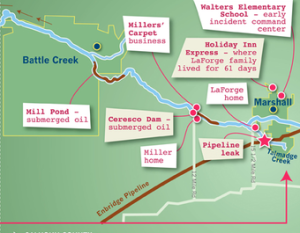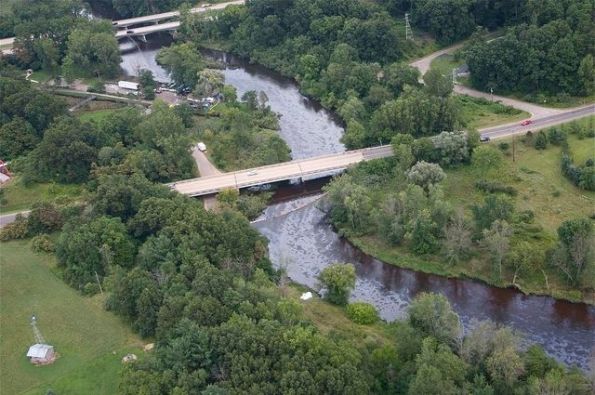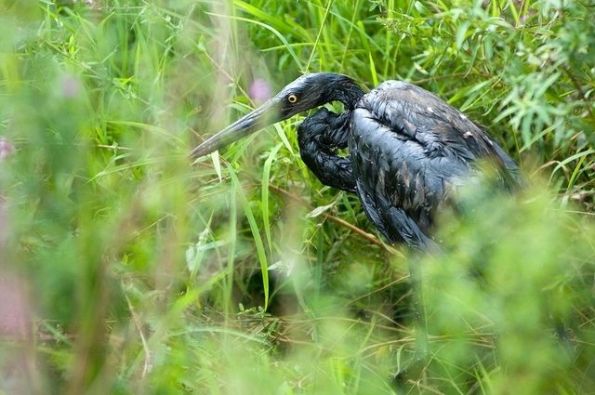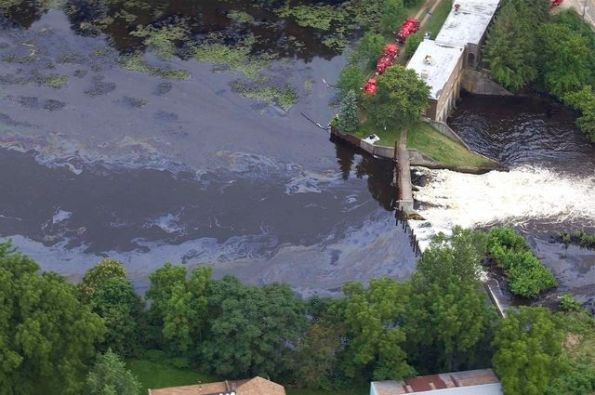Archive
Interview with journalist Paul McKay about pipeline economics in Canada
Time and time again, we hear from politicians that we need more pipelines to get Alberta’s oil to new markets. But Paul Mckay, an award-winning journalist who has looked at this issue closely, says this is all a shell game, smoke and mirrors designed to distract us from what’s really going on. McKay says the economics of new oil sands pipelines simply don’t make sense in today’s world, particularly if we have any hope of reducing our carbon emissions.
Paul McKay is an award-winning investigative reporter and author. His reports have been published by the Ottawa Citizen, Toronto Star, Globe and Mail, and Vancouver Sun. He recently wrote a series of articles for The Energy Mix about the faulty economic logic of Canadian oil sands exports called ‘Out of the Loop’.
EG Radio May 9: the Kalamazoo River oil spill 3 years later

Photograph: State of Michigan
This week on Earthgauge, we take a look back at what happened in Michigan in 2010 when an Enbridge pipeline ruptured spilling roughly 1 million gallons of oil into the Kalamazoo River. What is the legacy of the spill and is there anything for the rest of us to learn as we debate the construction of more pipelines from the tar sands of Alberta to B.C. and the Gulf of Mexico?
I have 3 interviews on the program today:
- Susan Connelly, a local resident of Marshall, MI where the spill occurred
- Jeff Insko, founder of the Line 6B citizen’s blog, a web site for residents who have pipelines running directly beneath their property
- Josh Mogerman, spokesperson for the Natural Resources Defence Council
We’ll also have our usual update from Kathy of Ecology Ottawa on local environmental events and campaigns.
Click the audio player above to stream the show or right click here to download.
Thanks to a fellowship from the Institute for Journalism and Natural Resources, I had the opportunity to travel to Kalamazoo and the surrounding area last week to learn about the Kalamazoo River and, in particular, the Enbridge oil spill of 2010.

On Sunday, July 25, 2010, Enbridge Line 6B ruptured near Marshall, Mich. and released more than one million gallons of tar sands diluted bitumen into Talmadge Creek and the Kalamazoo River. Illustration by Catherine Mann for InsideClimate News.
Remember that one? It happened on July 25 just a couple weeks after BP finally sealed their leak in the Gulf of Mexico following the explosion of the Deep Water horizon oil rig that killed 11 workers.
Six inches of rain fell in the days after the Enbridge pipeline spill, raising Talmadge Creek and the Kalamazoo River into “a roiling brown torrent that overflowed its banks by several feet,” according to the seven-month, Pulitzer prize-winning investigation conducted by InsideClimate News. Talmadge Creek, which is usually five to six feet wide and a foot deep, stretched 100-feet wide after the downpour.
The spill occurred in Marshall, a community of 7,400 in southwestern Michigan. It drove 150 families permanently from their homes, yet the media spotlight never settled on their story — perhaps in part because this spill occurred 10 days after BP Plc’s Macondo well was finally capped after three months of spewing oil into the Gulf of Mexico.
Enbridge Energy Partners, a U.S. affiliate of Enbridge Inc., operated the pipeline. The company has spent more than $765 million cleaning up the spill.
Oiled sections of the Kalamazoo River reopened to the public in June 2012 — 23 months after the spill.

Photograph: State of Michigan
On today’s special show, we hear a couple different perspectives from residents who have been affected by the spill and its aftermath. First up is Susan Connelly, a local resident who was living near the oil spill when it occurred. Her kids daycare was just a half mile away so she tells us about some of the health effects her family and her community suffered immediately following the spill and in the intervening 3 years.
Susan Connelly (right click here to download):
Next we hear from another local resident Jeff Insko who started the Line 6B citizen’s blog. After the rupture of the pipeline known as line 6B, Enbridge decided to replace a huge section of pipe through Michigan, some of which runs through the property of local residents. Jeff will tell us why he has been less than satisfied in his dealings with Enbridge as they exercised their legal authority to do dig up his property and cut down all his trees in order to install new pipe. Will his experience be echoed by many other property owners as new pipelines are constructed in the coming years across North America?
Jeff Insko (right click here to download):
Finally, we hear from Josh Mogerman of the Natural Resources Defense Council on why he feels tar sands oil is much more difficult and problematic to transport through pipelines than conventional crude and how this may have played a role in the Kalamazoo spill.
Josh Mogerman (right click here to download):
First though, to get some context on what actually happened in the summer of 2010, we hear a piece from The Rachel Maddow Show on MSNBC, which was broadcast in July 2012 following the release of the US National Transportation Safety Board’s scathing report about Enbridge’s handling of the spill and their mistakes leading up to it.
Why does a pipeline rupture in Michigan matter? Well, because many plans are afoot for new pipelines from the tar sands of Alberta, including proposals through the US in the form of the Keystone XL pipeline and to the west coast of B.C. with the Northern Gateway pipeline. So today we’re going to find out about the experiences of local residents looking back 3 years later at the Kalamazoo River spill in 2010. Let’s hope we’ve learned our lessons and don’t repeat the mistakes of Kalamazoo as we debate the merits of constructing new pipelines across North America to extract even more tar sands oil at ever increasing rates.

Photograph: State of Michigan

Photograph: State of Michigan

Photograph: State of Michigan
Tomorrow on EG Radio: the Kalamazoo River oil spill

This week on Earthgauge, we’ll take a look back at what happened in Michigan in 2010 when an Enbridge pipeline ruptured spilling roughly 1 million gallons of oil into the Kalamazoo River. What is the legacy of the spill and is there anything for the rest of us to learn as we contemplate the construction of more pipelines from the tar sands of Alberta to B.C. and the Gulf of Mexico?
I was in Kalamazoo and the surrounding area last week and I had the opportunity to speak with residents who have been affected by the spill and its aftermath. First we hear from Susan Connelly, a local resident who was living near the site of the spill when it occurred. Her kids’ daycare was just a half mile away so she’ll tell us about some of the health effects her family and her community suffered following the spill and in the intervening 3 years.
Next we’ll hear from another local resident, Jeff Insko, who started the Line 6B citizen’s blog. After the rupture of the pipeline known as line 6B, Enbridge decided to replace a huge section of pipe through Michigan, some of which runs beneath the property of local residents. Jeff will tell us why he has been less than satisfied in his dealings with Enbridge as they exercised their legal authority to dig up his land and cut down his trees in order to install their new pipe.
We’re also going to get an overview of the incident from Rachel Maddow of MSNBC who did a feature last summer when the US National Transportation Safety Board issued a scathing report about Enbridge’s handling of the spill and their mistakes leading up to it.
Of course we’ll also have our usual update from Kathy of Ecology Ottawa on local environmental events and campaigns. That’s at around 7:50.
Tune in tomorrow!
And now a few comments on The Tyee’s new sustainable energy project…
In my post below, I recommended following a new investigative reporting series being produced by The Tyee. I commend this initiative as it is important, timely and deserves our attention. Now for some thoughts on what The Tyee is hoping to achieve with this project.
First, a few words of caution beginning with David Beer’s premise in launching this series on the polarized debate between “Oil sands full bore? Oil sands full stop? Neither is realistic.”
This is not really accurate. I agree that “Oil sands full stop” seems highly improbable for the reasons that David points out, but “Oil sands full bore” is very much within the realm of possibility and is in fact the desired outcome by many (most?) of those individuals in government and industry who are currently controlling the levers of power.
Will an appeal to “the middle path” as this Tyee project endeavours to do convince the political and economic masters to alter their course? I am highly skeptical.
Correct me if I’m wrong but the premise of this series seems to be that both sides are taking an extreme position but we can indeed have our cake and eat it too if we manage this resource better. That there are both “challenges” and “opportunities” that lie ahead. [An aside: when I worked in government, “challenges” was always used as a euphemism for “problems”.]
Yet such a “solution” is only feasible IF both of the so-called “extreme” positions are in fact wrong. In other words, if the truth therefore lies somewhere in the middle. If it turns out, as many scientists believe, that climate change and the state of the global environment is so serious as to warrant a revolutionary shift in how we produce and consume energy, it seems to me that the “middle way” will only delay, yet not solve the inevitable crisis staring us in the face.
Yes, it’s true due to political/economic realities that we can’t/won’t shut down the tar sands or get off fossil fuels tomorrow but that doesn’t mean taking such a position is wrong from the perspective of what science is now telling us. I fear that any meaningful solution will not come from an appeal for all of us to “just get along” (R.I.P Rodney King) but will only come through conflict and confrontation. I hope I’m wrong about this.
Bill McKibben speaks out against tar sands expansion and the Northern Gateway pipeline
Video courtesy of The Common Sense Canadian and The Tyee from a speech activist and author Bill McKibben gave in Vancouver yesterday. The rally was organized on the 23rd anniversary of the Exxon Valdez oil spill to oppose both the Enbridge Northern Gateway Pipeline and Kinder Morgan’s planned expansion to its Trans Mountain pipeline to Vancouver.
An excerpt: “Don’t let them ever call you a ‘radical’. The radicals work at Kinder Morgan and Enbridge. They are willing to alter the chemical composition of the atmosphere in order to make money.”
Northern Gateway pipeline would threaten whales: DFO
Gateway pipeline would threaten whales: DFO.
Oh dear. Yet another strike against Northern Gateway. I think Postmedia’s Mike DeSouza is deserving of a big thumbs-up for his continued work on exposing the truth about Northern Gateway. Now we learn that the proposed pipeline “threatens critical habitat of humpback whales off the coast of British Columbia, say newly released internal federal documents from the Department of Fisheries and Oceans.”
You can find more details on these internal government documents here.
Earthgauge interview with IPCC Climate Scientist Andrew Weaver

I interviewed Dr. Andrew Weaver in December 2011 just before the latest round of international climate change negotiations in Durban, South Africa. He is the Canada Research Chair in Climate Modeling and Analysis at the University of Victoria and one of the key authors of several of the UN Intergovernmental Panel on Climate Change. I thought it would be worth posting this interview now in its entirety given that Dr. Weaver is once again in the news today.
It seems he has just published an article in the journal Nature in which he analyzes how burning all global stocks of fossil fuels would influence global temperatures. He found that mining and burning all of the tar sands oil of northern Alberta would raise global temperatures by about .36 degrees C. By contrast, burning all of the world’s vast coal deposits would increase temperatures by 15 degrees.
Naturally, we can expect tar sands advocates to jump all over this analysis but they should probably think twice before leaping to any premature conclusions. Dr. Weaver’s analysis does not consider the other, very significant impacts of tar sands developments including the destruction of boreal forest, pollution, water consumption, health impacts and so on. Greenhouse gas emissions from tar sands operations are still higher than conventional oil and the various tar sands projects underway constitute the largest industrial project on Earth.
Dr. Weaver has also made it explicitly clear on many occasions (as he did in our interview in no uncertain terms) that he feels we have to get ourselves off fossil fuels as soon as possible by putting a price on carbon. He believes governments have an active role to play in helping us do so. In our chat, he expressed his extreme disappointment and dismay with the current Canadian government and speculated as to why they are so obstructionist in the face of overwhelming scientific evidence about the serious dangers of continued fossil fuel use. His latest analysis simply looks at the relative contributions to global warming from the various sources of fossil fuels and concludes that coal and gas are by far our biggest long-term problems, not oil.
“This idea that we’re going to somehow run out of coal and natural gas and fossil fuels is really misplaced,” says Weaver. “We’ll run out of human ability to live on the planet long before we run out of them.”
“I have always said that the tar sands are a symptom of a very big problem. The problem is dependence on fossil fuels.”
Earthgauge radio podcast January 26, 2012: Fighting the Enbridge Northern Gateway Pipeline

On Earthgauge radio this week, we’ll be talking about the proposed Enbridge Northern Gateway Pipeline. Hearings of the National Energy Board looking into the pipeline proposal got underway in B.C. this month with over 4000 people scheduled to speak as intervenors. The oil industry in Canada and the federal government are pushing hard to see that the pipeline is built, yet opposition to the project, particularly among First Nations communities along the proposed pipeline route, is fierce. We take a look at the potential environmental impacts of the pipeline, the strategic energy security implications of liquidating tar sands oil, the economics of the project and the political context. Right click here to download the entire show.
We have 3 interviews on our special show today:
- Emma Gilchrist, Communications Director for the Dogwood Initiative
- Energy analyst and geoscientist, David Hughes
- Author and journalist, Murray Dobbin
If constructed, the Northern Gateway pipeline would transport heavy bitumen oil from the tar sands of northern Alberta to the north coast of BC. Although the National Energy Board hearings have just begun, already the federal government has weighed in before the environmental panel has even had a chance to do its work and make a recommendation on whether or not to proceed with the project. Prime Minister Stephen Harper has already said the pipeline is in the national interest and must proceed while federal Natural Resources Minister Joe Oliver has labelled those opposed to the project, which includes environmentalists, fishermen, ranchers, ordinary citizens and First Nations, as foreign-funded radicals.
So what is this project all about? Well, basically the company Enbridge wants to build two 1200km pipelines – one would take 500,000 barrels a day of tar sands crude across the Rockies to Kitimat on the B.C. coast, where over 200 supertankers a year would take the oil for export to the U.S. and Asia. A second pipeline in the other direction would take a natural gas condensate back to the tar sands, which helps the oil flow through the pipe.
The pipelines would cross hundreds of rivers and streams and pass through a region renowned for its salmon, wolves, bears and other wildlife. It would also help to triple the production of tar sands crude, which is among the dirtiest and most destructive forms of energy, thereby greatly increasing Canada’s greenhouse gas emissions.
Not surprisingly, the proposed project has sparked an eruption of opposition among those who see the possibility of an oil spill as a critical threat to the environment and the livelihoods of tens of thousands of people. Northern Gateway would have to cross the lands and waters of many BC First Nations, the vast majority of whom are opposed to the project, some maintaining that it must be stopped at almost any cost. In December, 130 aboriginal groups in B.C. said they were joining forces to use “whatever means necessary” to stop the project.
Meanwhile, industry and the Harper government say exploiting Canada’s abundant tar sands is vital for prosperity, particularly in light of a recent decision of US president Barack Obama to delay approval of the equally controversial Keystone XL pipeline which would transport tar sands crude to the Gulf of Mexico. Given this delay, Harper said recently that, “it is particularly essential for this country that we have the capacity to sell our energy products into the growing markets of Asia.”
One thing is for sure – a long and bitter fight lies ahead with some calling it the most significant environmental battle in Canadian history.
We’re taking a hard look at this project on Earthgauge today. First we hear from Emma Gilchrist of the organization Dogwood Initiative who talks about some of the possible environmental impacts of the project and updates us on the progress of the NEB hearings. Then we hear from the respected geologist David Hughes who discusses whether there is even a need for the project from the perspective of Canada’s strategic energy reserves. And finally for the political perspective I speak with the journalist Murray Dobbin who fills us in on how the federal government is manoeuvring to ensure that the project be approved despite all the opposition to it.
We also have our usual segment with Kathy of Ecology Ottawa who updates us on local environmental events and campaigns. I’ve listed a few of the upcoming events below and you can click here to see a complete list with full details.
Contact us at . Please do get in touch if you have story ideas, a comment on something you’ve heard or want to get involved or contribute to the show. You can also download our podcasts on iTunes. Just type “earthgauge” into the search bar and you’ll find us.
January 31, 2012
City Council Meeting – Environment Committee
When: January 31, 9:30 to 11:30 am
Where: City Hall, Andrew S. Haydon Hall, 110 Laurier Avenue West
February 1, 2012
City Council Meeting – Transportation Committee
When: February 1, 9:30 to 11:30 am
Where: Champlain room, Ottawa City Hall
Phone: 613-580- 2424 ext. 21624
February 1, 2012
The World We Want – An evening with Francis Moore Lappé
USC Canada presents an inspiring evening with the visionary author of the groundbreaking Diet for a Small Planet (1971), Frances Moore Lappé. Based on her new book, EcoMind, Lappé confronts our current myths about markets, food, and environmental issues, challenging us to change the way we think so we can create the world we want.
When: February 1, 7:30 to 9:00 pm
Where: St. Brigid’s Centre for the Arts, 310 St. Patrick Street
Wednesday February 1 and 8, 2012
Weekly environmental choir rehearsals
Just Voices is Ottawa’s only environmental and social-justice theme choir. They have been singing at events around the capital since 2003. They welcome new members at any time, and prior musical experience is not necessary. For more information, visit http://www.justvoices.ca.
When: February 1, 7:00 to 9:00 pm
Where: The Bronson Centre, 211 Bronson Ave
February 6, 2012
City Council Meeting – Roads and Cycling Advisory Committee
When: February 6, 7:00 to 9:00 pm
Where: City Hall, Honeywell Room
February 9, 2012
City Council Meeting – Environmental Advisory Committee
When: February 9, 6:30 – 8:30 pm
Where: City Hall, Andrew S. Haydon Hall
February 9, 2012
Green Drinks Ottawa
Green Drinks is an open invitation to anyone interested/working/studying all things environmental. Come and join us for interesting, and inspiring conversation. We’re an informal, self-organizing network and meet every second Thursday of the month. For more information, contact: [email protected].
When: February 9, 5:30 to 7:30 pm
Where: Fox and Feather Pub & Grill, 283 Elgin street
Read my article published in the Common Sense Canadian: Could the Tide Slowly be Turning Against Dirty Oil?
I am pleased to be contributing to the excellent online news and commentary publication The Common Sense Canadian. My first article, entitled Obama’s Keystone XL Reversal: Could the Tide Slowly be Turning Against Dirty Oil?, appeared on their web site yesterday. The full article is printed below.
Obama’s Keystsone XL Reversal: Could the Tide Slowly be Turning Against Dirty Oil?
Strolling around Washington, D.C. last weekend, I came upon an impressive memorial to the famous wartime president Franklin Roosevelt. Upon the gray granite walls were inscribed many of FDR’s most memorable quotations. “Men and nature must work hand in hand,” he wrote in a 1935 message to Congress. “The throwing out of balance of the resources of nature throws out of balance also the lives of men.”
Having traveled to the U.S. capital to cover the latest protest of the Keystone XL project, I wondered what FDR might say about TransCanada’s controversial pipeline proposal. A pipeline that would transport tar sands crude from northern Alberta to the Gulf of Mexico, Keystone has been described as a 2700 km “fuse to the biggest carbon bomb on the planet” in the words of author and activist Bill McKibben. Protest organizers had hoped to encircle the White House with at least 4000 people in what McKibben called both an “O-shaped hug” and “house arrest.” Instead, at least 10,000 protesters showed up, young and old, from all over North America, ringing President Obama’s residence three-deep. Read more…


